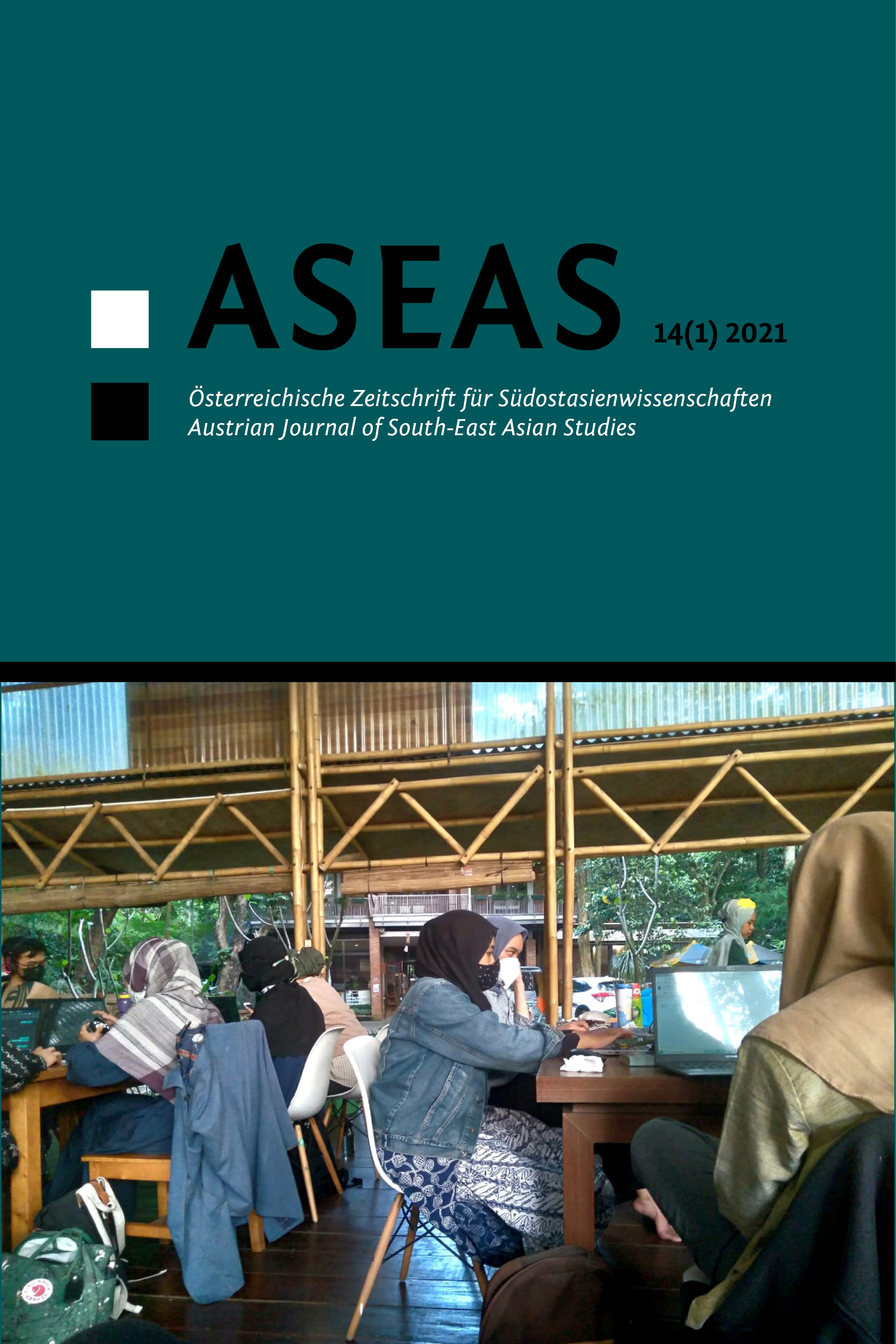Malaysia-News - eine Facebook-Gruppe: Ein Erfahrungsbericht in Social Media Nutzung
DOI:
https://doi.org/10.14764/10.ASEAS-0050Keywords:
Facebook, Malaysia, Movement Control Order, Online Research, Social MediaAbstract
This paper deals with a Facebook-group named Malaysia-News. This group was founded in August 2019 and saw a rapid increase in members, especially in Southeast Asia. The analysis of the development of this group is based on data from Facebook and concerns the expansion of membership and the motivation to join. It shows that membership increased significantly after incisive events took place in Malaysia in early 2020 and that users are primarily looking for trustworthy information.
References
Chamberlain, J. (2020, May 12). Coronavirus has revealed the power of social networks in a crisis. https://theconversation.com/coronavirus-has-revealed-the-power-of-social-networks-in-a-crisis-136431
Chin, E. S. M. (2020, April 4). Think tank: Xenophobia, racism rampant on social media amid global Covid-19 lockdowns, Malaysia included. https://www.malaymail.com/news/malaysia/2020/04/04/think-tankxenophobia-racism-rampant-on-social-media-amid-global-covid-19-l/1853502
Einzenberger, R. (2016). “If It’s on the Internet It Must Be Right”: An Interview with Myanmar ICT for Development Organisation on the Use of the Internet and Social Media in Myanmar. Austrian Journal of South-East Asian Studies, 9(2), 301-310.
Esau, K., Frieß, D., & Eilders, C. (2019). Online-Partizipation jenseits klassischer Deliberation. Eine Analyse zum Verhältnis unterschiedlicher Deliberationskonzepte in Nutzerkommentaren auf Facebook-Nachrichtenseiten und Beteiligungsplattformen. In I. Engelmann, M. Legrand, & H. Marzinkowski (Eds.), Politische Partizipation im Medienwandel (S. 221-245). https://doi.org/10.17174/dcr.v6.0
Humer, S. (2020). Internetsoziologie. Theorie und Methodik einer neuen Wissenschaft. De Gruyter.
Ika, K. I., & Nuurianti, J. (2020, April 28). How blaming others dominates Indonesian and Malaysian Twitterspheres during COVID-19 pandemic. https://theconversation.com/how-blaming-othersdominates-indonesian-and-malaysian-twitterspheres-during-covid-19-pandemic-136193
Kneidinger, B. (2010). Facebook und Co. Eine soziologische Analyse von Interaktionsformen in Online Social Networks. Springer.
Rahim, S. A., & Pawanteh, L. (2011). Democratization of Information in Malaysia: A Responce to
Globalization. Asian Social Science, 7(2), 3-11.
Rahman, N. A. A., Hassan, M. S. H., Osman, M. N., & Waleed, M. (2017). Research on the state of social media studies in Malaysia: 2004-2015. Malaysian Journal of Communication, 33(4), 38-55.
Tapsell, R. (2020). Deepening the understanding of social media’s impact in Southeast Asia. ISEAS Trends, 4. https://www.iseas.edu.sg/wp-content/uploads/2020/02/TRS4_20.pdf
Downloads
Published
Issue
Section
License
Copyright (c) 2021 Society for South-East Asian Studies (SEAS)

This work is licensed under a Creative Commons Attribution-NonCommercial-NoDerivatives 4.0 International License.
For all articles published in ASEAS before December 2014 and after July 2022, copyright is retained by the authors. For articles published between January 2015 and June 2022, the Society for South-East Asian Studies (SEAS) is the copyright holder. Articles published in ASEAS before December 2019 are licensed under the following Creative Commons License: Attribution-NonCommercial-NoDerivs 3.0 Unported. Articles published after that date are licensed under the following Creative Commons License: Attribution-NonCommercial-NoDerivs 4.0 International. In both cases, this means that everybody is free to share (to copy, to distribute, and to transmit the work) under the following conditions:
-
Attribution — You must give appropriate credit, provide a link to the license, and indicate if changes were made. You may do so in any reasonable manner, but not in any way that suggests the licensor endorses you or your use.
-
NonCommercial — You may not use the material for commercial purposes.
-
NoDerivatives — If you remix, transform, or build upon the material, you may not distribute the modified material.


